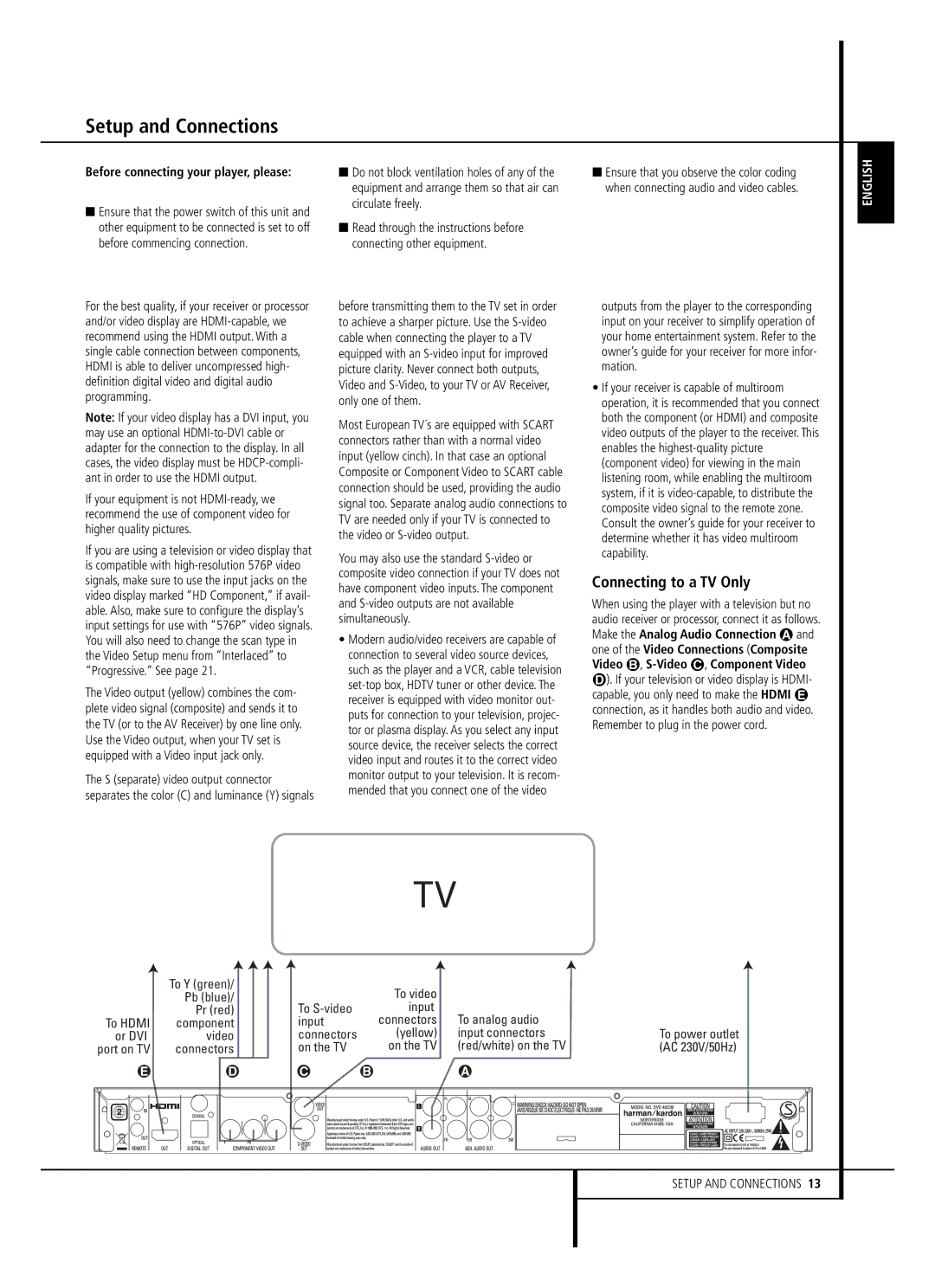
Setup and Connections
Before connecting your player, please: | ■ Do not block ventilation holes of any of the | ■ Ensure that you observe the color coding |
| equipment and arrange them so that air can | when connecting audio and video cables. |
■ Ensure that the power switch of this unit and | circulate freely. |
|
|
| |
other equipment to be connected is set to off | ■ Read through the instructions before |
|
before commencing connection. | connecting other equipment. |
|
ENGLISH
For the best quality, if your receiver or processor and/or video display are
Note: If your video display has a DVI input, you may use an optional
If your equipment is not
If you are using a television or video display that is compatible with
The Video output (yellow) combines the com- plete video signal (composite) and sends it to the TV (or to the AV Receiver) by one line only. Use the Video output, when your TV set is equipped with a Video input jack only.
The S (separate) video output connector separates the color (C) and luminance (Y) signals
before transmitting them to the TV set in order to achieve a sharper picture. Use the
Most European TV´s are equipped with SCART connectors rather than with a normal video input (yellow cinch). In that case an optional Composite or Component Video to SCART cable connection should be used, providing the audio signal too. Separate analog audio connections to TV are needed only if your TV is connected to the video or
You may also use the standard
•Modern audio/video receivers are capable of connection to several video source devices, such as the player and a VCR, cable television
outputs from the player to the corresponding input on your receiver to simplify operation of your home entertainment system. Refer to the owner’s guide for your receiver for more infor- mation.
•If your receiver is capable of multiroom operation, it is recommended that you connect both the component (or HDMI) and composite video outputs of the player to the receiver. This enables the
Connecting to a TV Only
When using the player with a television but no audio receiver or processor, connect it as follows. Make the Analog Audio Connection A and one of the Video Connections (Composite Video B,
|
|
|
|
|
| To Y (green)/ |
|
|
|
|
| |||||||
|
|
|
|
|
|
| Pb (blue)/ |
|
|
|
|
| ||||||
|
|
|
|
|
|
|
| Pr (red) |
|
|
|
|
| |||||
| To HDMI | component |
|
|
|
|
| |||||||||||
|
|
| or DVI |
|
|
| video |
|
|
|
|
| ||||||
port on TV | connectors |
|
|
|
|
| ||||||||||||
|
|
|
| E |
|
|
|
|
|
| D |
|
| |||||
|
|
|
|
|
|
|
|
|
|
|
|
|
|
|
|
|
|
|
|
|
|
|
|
|
|
|
|
|
|
|
|
|
|
|
|
|
|
|
|
|
|
|
|
|
|
|
|
|
|
|
|
|
|
|
|
|
|
|
|
|
|
|
|
|
|
|
|
|
|
|
|
|
|
|
|
|
|
|
|
|
|
|
|
|
|
|
|
|
|
|
|
|
|
|
|
|
|
|
|
|
|
|
|
|
|
|
|
|
|
|
|
|
|
|
|
|
|
|
|
|
|
|
|
|
|
|
|
|
|
|
|
|
|
|
|
|
|
|
|
|
|
|
|
|
|
|
|
|
|
|
|
|
|
|
|
|
|
|
|
|
|
|
|
|
|
|
|
|
|
|
|
|
|
|
|
|
|
|
|
|
|
|
|
|
|
|
|
|
|
TV
|
|
|
| To video |
|
|
|
|
|
|
|
|
| |||
To |
|
| input |
|
|
|
|
|
|
|
|
| ||||
input |
| connectors | To analog audio | |||||||||||||
connectors |
| (yellow) | input connectors | |||||||||||||
on the TV |
| on the TV | (red/white) on the TV | |||||||||||||
C | B |
|
|
|
| A | ||||||||||
|
|
|
|
|
|
|
|
|
|
|
|
|
|
|
|
|
|
|
|
|
|
|
|
|
|
|
|
|
|
|
|
|
|
|
|
|
|
|
|
|
|
|
|
|
|
|
|
|
|
|
|
|
|
|
|
|
|
|
|
|
|
|
|
|
|
|
|
|
|
|
|
|
|
|
|
|
|
|
|
|
|
|
|
|
|
|
|
|
|
|
|
|
|
|
|
|
|
|
|
|
|
To power outlet (AC 230V/50Hz)
SETUP AND CONNECTIONS 13
